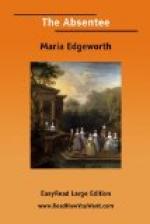’No, my dear mother; he is much better provided for than we could have expected. One of my father’s first objects was to prevent him from being any encumbrance to you. We consulted him as to the means of making him happy; and the knight acknowledged that he had long been casting a sheep’s eye at a little snug place, that will soon be open, in his native country—the chair of assistant barrister at the sessions. “Assistant barrister!” said my father; “but, my dear Terry, you have all your life been evading the laws, and very frequently breaking the peace; do you think this has qualified you peculiarly for being a guardian of the laws?” Sir Terence replied, “Yes, sure; set a thief to catch a thief is no bad maxim. And did not Mr. Colquhoun, the Scotchman, get himself made a great justice, by his making all the world as wise as himself, about thieves of all sorts, by land and by water, and in the air too, where he detected the mud-larks?—And is not Barrington chief-justice of Botany Bay?”
’My father now began to be seriously alarmed, lest Sir Terence should insist upon his using his interest to make him an assistant barrister. He was not aware that five years’ practice at the bar was a necessary accomplishment for this office; when, fortunately for all parties, my good friend, Count O’Halloran, helped us out of the difficulty, by starting an idea full of practical justice. A literary friend of the count’s had been for some time promised a lucrative situation under Government; but, unfortunately, he was a man of so much merit and ability, that they could not find employment for him at home, and they gave him a commission, I should rather say a contract, abroad, for supplying the army with Hungarian horses. Now the gentleman had not the slightest skill in horseflesh; and, as Sir Terence is a complete jockey, the count observed that he would be the best possible deputy for his literary friend. We warranted him to be a thoroughgoing friend; and I do think the coalition will be well for both parties. The count has settled it all, and I left Sir Terence comfortably provided for, out of your way, my dear mother, and as happy as he could be, when parting from my father.’
Lord Colambre was assiduous in engaging his mother’s attention upon any subject which could for the present draw her thoughts away from her young friend; but, at every pause in the conversation, her ladyship repeated, ’So Grace is an heiress, after all—so, after all, they know they are not cousins! Well! I prefer Grace, a thousand times over, to any other heiress in England. No obstacle, no objection. They have my consent. I always prophesied Colambre would marry an heiress; but why not marry directly?’




